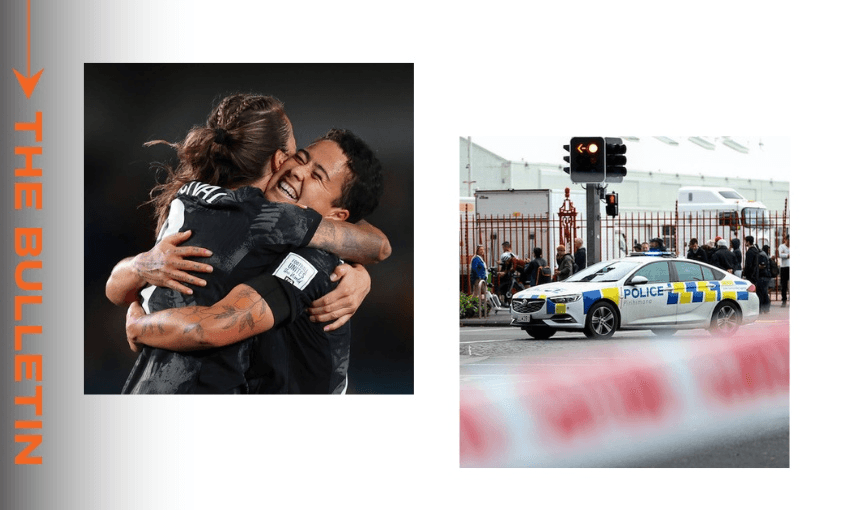Yesterday started with tragedy as a gunman opened fire in Auckland. It ended with a historic win for the Football Ferns. We grapple with one event and celebrate the other, writes Anna Rawhiti-Connell in this excerpt from The Bulletin, The Spinoff’s morning news round-up. To receive The Bulletin in full each weekday, sign up here.
We are not immune to the devastation caused by gun violence
Yesterday morning, Auckland’s mayor Wayne Brown closed his interview with Radio NZ about the shooting in Auckland’s CBD by saying “This is not something that happens in our country.” He is right in the sense that we don’t hear the term “active shooter” anywhere near as frequently as it is heard in the United States. But these things do happen here. As history has proven, we are not immune to the devastation caused by gun violence, the circumstances that give rise to events like this or the need to ask questions about gun control. Somehow we have to grapple with that. This is something that happens in this country.
What we currently know about yesterday
As to yesterday’s event, details are still emerging but here is what we do know. Three people died including the shooter, Matu Reid. Seven people remain in hospital. Police are still trying to identify the two victims shot dead by Reid as he opened fire at a construction site in downtown Auckland. A scene examination will continue today. We know Reid did not have a license for the gun used in the shooting but that it was not a weapon banned following the March 15 terror attacks in 2019. A sentencing report obtained by media last night reveals that Reid was serving a sentence of five months’ home detention for domestic violence charges at the time of the shooting and had approval to travel to work at the building site where the shooting took place. A cultural report prepared for the court before Reid’s sentencing described a history of systemic deprivation, exposure to domestic violence and physical abuse. The report writer said there may also be some mental health issues. Corrections are now undertaking a review of the handling of Reid’s home detention. Prime minister Chris Hipkins said yesterday that he has also seeking advice on whether there should be a wider system review.
Questions about gun control and sentencing to come
With regard to other things that happen in this country, political leaders put politics aside yesterday. Most shared confirmed information, safety advice and messages of comfort and condolence from both big and small podiums and did not politicise the issue. You can argue that’s a basic expectation but in 2023, events, tragic or otherwise, are instantly and often speciously politicised by political figures across the world. We shouldn’t take the response from our leaders yesterday for granted. It’s clear however that yesterday’s appropriate deflection of questions about sentencing, home detention and gun control, won’t hold forever. Last year, Dame Jacinda Ardern received applause for our ban on semi-automatic weapons from the audience during an appearance on The Late Show with Stephen Colbert. Back home, on the same day, police did not answer a question about how gangs were continuing to stockpile arms. Statistics published last year showed that when compared to the previous decade, there was a 53% increase in gun crime and a 327% increase in injuries caused by guns in the year to 31 July 2022. There is also debate about the role of the freshly launched gun registry in stopping illicit guns from falling into the wrong hands.
‘Flickers of that strange, defiant, joyful, ineffable stuff of life’
Yesterday, we also welcomed the world to the opening ceremony and opening game of the Fifa World Cup. Eden Park in Auckland was packed. A moment’s silence was observed to honour the lives taken yesterday morning. Visitors were welcomed as volunteers handed out poi on arrival. This is also something that happens in this country. I watched the game from home but Toby Manhire was there and has done a superb job capturing the atmosphere at Eden Park and the significance of the historic win for the Football Ferns against Norway and the event as a bookend to an awful, tragic day.
“July 20 2023 will go down as a grievous, lamentable day for the city, and a game of football is trivial beside it. And still, in moments, when 42,137 people and countless others beyond are a thousand feet high on something so daft as a ball game, there is something there. You see flickers of that strange, defiant, joyful, ineffable stuff of life.”
Read the rest of Manhire’s account here.


